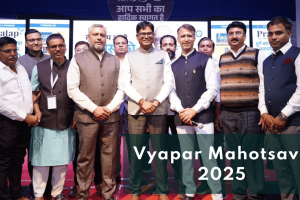Micro, Small, and Medium Enterprises (MSMEs) are critical drivers of economic development across the globe. Representing nearly 95% of all businesses worldwide, MSMEs contribute approximately 60% of global employment, highlighting their undeniable role in job creation and economic diversification. Despite this, MSMEs continue to face considerable barriers, particularly in their participation in international trade. Addressing these challenges is crucial for unlocking their full potential and driving economic growth, particularly in countries like India.
The Role of MSMEs in India’s Export Landscape
India’s MSMEs are at the forefront of the country’s export sector. In the fiscal year 2023-24, active MSME exporters registered under the Udyam scheme contributed a staggering US$ 127.5 billion to India’s exports, accounting for 29.2% of total merchandise exports. However, only a fraction—around 1% of the 3 crore Udyam-registered MSMEs—are actively involved in exports. This highlights a significant opportunity for growth, as untapped potential lies within the other 99% of MSMEs that are yet to venture into international markets.
For India to unlock this vast export potential, a multifaceted strategy is required to overcome the barriers that hinder MSMEs from expanding their global footprint. Such efforts are crucial not only for the businesses themselves but also for achieving the nation’s ambitious target of reaching US$ 2 trillion in exports by 2030.
Challenges Facing Indian MSMEs in International Trade
Despite their potential, Indian MSMEs face several challenges in integrating into global trade. One of the most significant barriers is the lack of access to information about products that have demand in international markets. A survey by Exim Bank found that 51.4% of MSMEs cited the absence of information on export opportunities as a key obstacle. This lack of market intelligence hinders MSMEs from identifying profitable export destinations and understanding the nuances of foreign market demand.
To address this, the creation of a consolidated digital platform offering real-time data on global trade, market trends, and regulatory updates is vital. The Government of India (GOI) has already made strides in this area with the launch of the Trade Connect e-platform, a resource aimed at bridging the knowledge gap and facilitating smoother market entry for MSMEs.
Quality Standards and Certifications: The Path to Global Competitiveness
Another major hurdle for MSMEs is meeting international product quality standards, including requirements related to packaging, eco-labeling, and mandatory certifications. Without adherence to these standards, MSMEs struggle to compete in global markets where consumers and regulators demand high-quality, compliant products.
To support MSMEs in overcoming this challenge, the GOI introduced the Capacity Building of First-Time MSE Exporters (CBFTE) scheme. This program offers reimbursements for costs related to certifications and other export-related expenses, easing the financial burden on MSMEs. However, awareness of this scheme is limited, and efforts must be intensified to ensure wider access and effective implementation. Additionally, further capacity-building initiatives are required to help MSMEs navigate complex certification processes and enhance their competitiveness on the global stage.
Marketing and Branding: Bridging the Gap with Larger Enterprises
One of the most cited challenges for MSMEs in international trade is the inability to compete with larger firms that have more extensive marketing resources. Exim Bank’s survey revealed that 27.5% of MSMEs struggle with marketing and branding, which are essential for capturing foreign customers. Digital marketing, which offers cost-effective solutions, remains underutilized, with 11.9% of MSMEs citing a lack of knowledge of digital tools.
The GOI offers support through schemes like the Market Development Assistance (MDA) and the Market Access Initiative (MAI), aimed at enhancing market access for exporters in both new and existing markets. However, consolidating these various support schemes into a single, streamlined program would significantly simplify access for MSMEs. A unified program could offer comprehensive support tailored to the unique needs of MSMEs, thereby bolstering their ability to compete in global markets.
Geographical Indications (GI): Tapping into Unique Export Potential
India is home to a vast array of products with Geographical Indications (GI) tags, many of which are produced by MSMEs. These GI-tagged products, celebrated for their cultural heritage and uniqueness, have significant export potential. However, promoting these products on the global stage requires strategic marketing partnerships.
India can draw inspiration from Italy’s successful promotion of its GI-tagged products. The Italian government, for instance, partnered with Amazon to promote products with protected geographical indication status. A similar approach in India, leveraging leading e-commerce platforms to promote Indian GI-tagged goods, could boost consumer trust and drive export growth. This strategy would enable MSMEs to capitalize on the unique value proposition of their products, enhancing their appeal in international markets.
Strengthening Institutional Support: The Role of Export Hubs and MSME Internationalization Centers
Institutional support is essential for enabling MSMEs to expand their global footprint. The GOI’s District Exports Hubs (DEH) initiative has already established State and District-level Export Promotion Councils across the country. To further strengthen this support system, MSME internationalization centers could be established in key export clusters. These centers would provide end-to-end export services, including logistics support, guidance on trade compliance, order management, and finance-related consultancy.
Such centers could also offer hands-on support to MSME exporters, helping them navigate the complexities of international trade and positioning them to compete more effectively in global markets.
Financing Solutions: Addressing the Capital Gap
Access to working capital is another significant barrier to MSMEs entering the export market. Innovative financing mechanisms, such as international factoring, could provide much-needed liquidity. International factoring, which is based on the quality of accounts receivable rather than traditional collateral, offers a flexible and efficient financing solution for MSME exporters.
While international factoring is still in its nascent stage in India, it holds significant potential for improving MSMEs’ export competitiveness by allowing them to offer competitive credit terms to their foreign buyers. To boost factoring volumes, the GOI could consider providing incentives similar to those available for rupee export credit, alongside regulatory easing.
Additionally, the Exim Bank’s Trade Assistance Programme, a new initiative in India, offers credit enhancements to mitigate payment and country risks in international trade transactions. Such innovative financial solutions could bridge the financing gap for MSMEs, enabling them to grow and diversify their export portfolios.
The Road Ahead: A Multifaceted Approach to MSME Growth
With a combination of targeted interventions, India’s MSMEs have the potential to become major players in the global economy. By addressing challenges related to market intelligence, quality standards, marketing, financing, and institutional support, the country can unlock the vast export potential of its MSME sector.
As India works towards its ambitious goal of reaching US$ 2 trillion in exports by 2030, MSMEs will play a pivotal role in driving this growth. Through strategic initiatives and concerted efforts to support MSMEs, India can not only boost its exports but also strengthen its position as a global trade powerhouse.












Add Comment